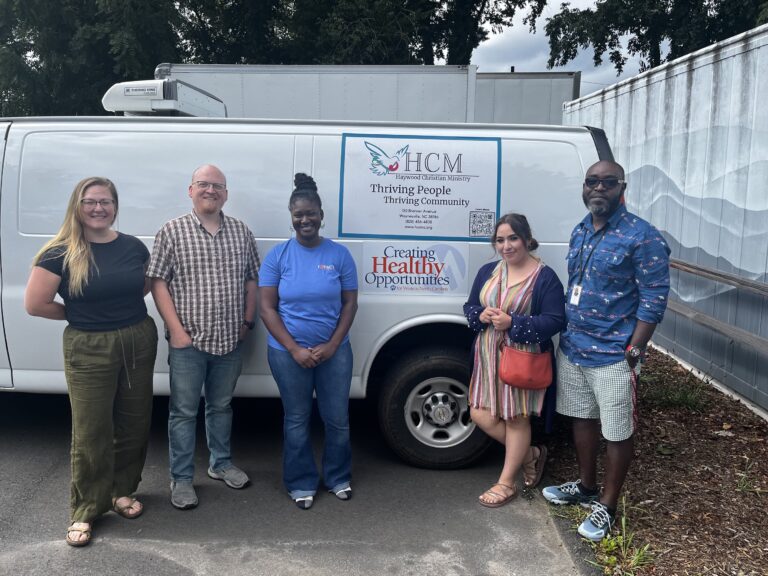Haywood Christian Ministry Prioritizes Inclusive Outreach
Like many rural community organizations, Haywood Christian Ministry (HCM) was founded to prevent friends and neighbors from falling through the safety net. Over the past 50 years, the faith-based organization has evolved from a volunteer crisis line to one of Haywood County’s largest nonprofits offering food, clothing, and housing assistance for those in crisis.
Despite all this growth, HCM was having a hard time reaching neighbors it knew were in need–some of the estimated 3,000 Hispanic and Latino people living in the area. The pandemic created an unexpected opportunity when COVID funding enabled the nonprofit to partner with a community health worker, Berenice Munoz Gamez, to deliver food boxes to Spanish-speaking community members. When COVID funding ended, HCM’s executive director Rev. Blake Hart asked Berenice to join the organization full time so she could continue serving Hispanic and Latino families.
“I love helping my community,” Berenice explains. “There are still many people who don’t know about the services that are available to them. When they do, they’re afraid that asking for help will impact them negatively.” For undocumented residents, that fear can keep them from seeking help even when it’s desperately needed.
Berenice understands. She is a long-time resident of Haywood County, but she was born in Michoacán in western Mexico. She moved to Western North Carolina as a child when her father found work on a small tomato farm. She was inspired to become a certified community health worker so she could support families like her own.
When HCM joined the Healthy Opportunities Pilot (HOP) in 2022, Berenice didn’t waste a moment getting the word out. She set up information tables outside of Mexican grocery stores, the public library, thrift stores, craft fairs, and even dentist’s offices. All this hard work paid off. Berenice has enrolled many Spanish-speaking families over the past year. Approximately, a quarter of the more than 400 HOP participants HCM serves are Hispanic or Latino like Rosa’s family.
Rosa had recently given birth and had an older child with a chronic health condition and Medicaid Managed Care, which qualified the family for HOP. Berenice was able to communicate with Rosa in Spanish and realized that their living situation was aggravating her child’s asthma. She arranged for a home inspection that identified the need for a new dryer and pest control measures, both of which were covered through the pilot and have improved the family’s indoor air quality and health.
Berenice helped another participant whose husband was in a car accident leaving the family with no way to get groceries. Weekly HOP food box deliveries helped fill the gap while he recovered. Bernice worked with HCM’s HOP coordinator, Theo Ouedraogo, to expedite the delivery of a recliner to another client who was struggling with intense back pain and hadn’t been able to sleep comfortably for quite some time.
Bernice and Theo work together in a variety of ways to address HOP participants’ needs whether that means delivering locally farmed produce or coordinating much-needed home repairs or paying a utility bill to keep the lights on. They also work with clients at every stage of the pilot from enrollment through service delivery and follow-up to screen for additional social needs like the Valdez family had.
This family lost their primary source of income and their home in one fell swoop when the Canton paper mill shut down. Luckily, they had Medicaid Managed Care and qualified for pilot services. Their care manager referred them to several local HOP service providers who worked collaboratively to stabilize the family. Haywood Pathways Center provided the family with supportive shelter and move-in assistance while other supports were being put into place including a housing voucher from Mountain Projects and healthy home goods from HCM.
Although the Valdez family didn’t need home repairs, HCM offers that pilot service too. To date, they have helped 18 families with home repairs totaling more than $140,000 thanks to the nonprofit’s strong working relationships with local craftspeople. HCM and the other pilot organizations have invested in local farms as well, making the pilot a win for both participants and Haywood County’s economy.

